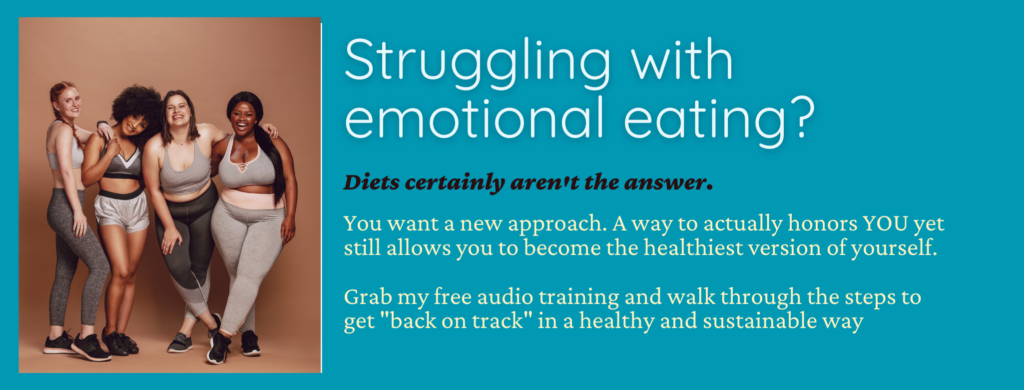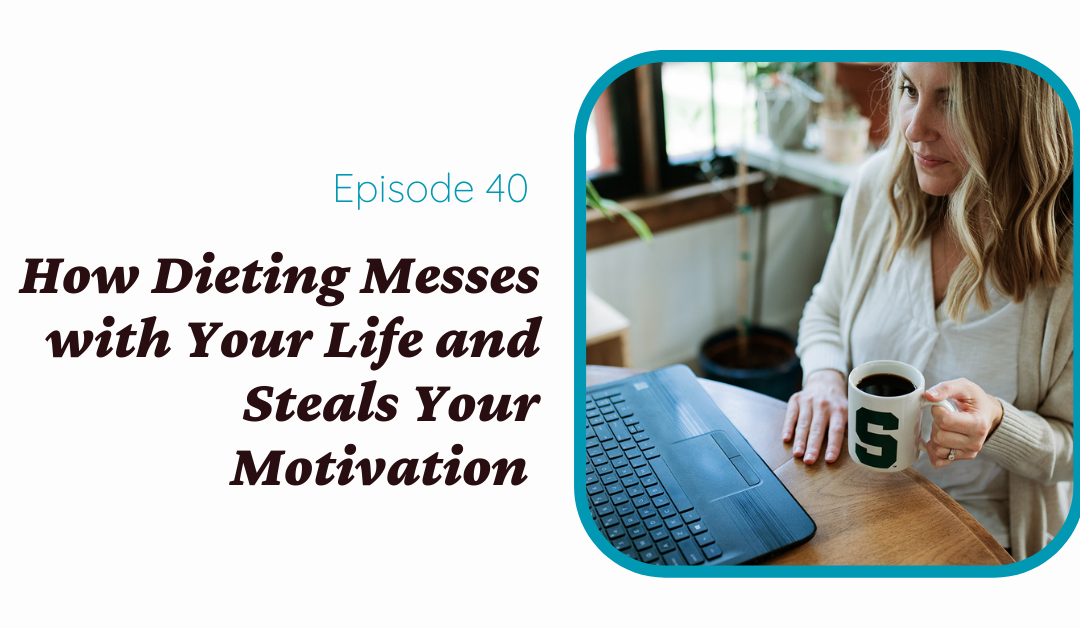Podcast: Play in new window | Download
Subscribe to Motivation Made Easy! Apple Podcasts | Google Podcasts | Spotify | RSS | More
Episode 40. This episode is all about why dieting does not work and how getting caught in the ineffective dieting cycle keeps us distracted from learning to take great care of ourselves and focusing on the things that matter.
Topics Covered
- We talk about why dieting does not work and instead causes stress and often increases food obsession.
- Although many people assume that they are “failing the diet”, many of their perceived “failures” (like binge eating) are 100% caused by dieting itself. But yet, we blame ourselves and start another diet or “eating plan” and keep the cycle going.
- Giving up dieting does not mean giving up any pursuit of your health. In fact, quite the opposite is usually true. Giving up dieting lets us see more clearly what matters and what we need to do logistically to improve our health, if that’s what we choose. We just get to do it without all the diet-binge-shame BS.
- I talk about the Minnesota Starvation Experiment and how 36 men that were “starved” (put on a 1570 per day diet and lost 25% of their weight) became obsessed and preoccupied with food, and lost all interest in other things like hobbies, sex, etc (Keys et al., 1950). I discuss some of what this can teach us about the biological impact of dieting.
- I talk about the research study looking at calorie restriction without food monitoring (with pre-packaged meals) and how that increased cortisol, suggesting that calorie restriction itself inherently causes stress (Tomiyama et al., 2011) which makes us more prone to weight gain.
Learn More About How Dieting Fails Us
Check out my blog post for a comprehensive overview of the ways diet fails us (called “How Dieting Fails Us: A Comprehensive Guide“).
Self Control is a Limited Resource
We only get so much willpower and self control in a given day.
People with sustainable habits they feel good about are not fighting tooth and nail every single day to keep them up.
If you find that you DO have to use significant energy and willpower on simply maintaining your habits, then chances are they aren’t sustainable.
And believe it or not, it IS possible to form practices that don’t exhaust you.
I wrote previously about how to use this knowledge in our favor and learn to make habit changes that can actually last over the long haul. Check out the post here: NEWSFLASH: No One Has Enough Willpower for Dieting.
Dieting Messes with our Biology
It isn’t just in your head.
Food is fuel, and we need enough of it to thrive.
Our bodies fight incredibly hard to reject our dieting attempts, and much of the weight regain people experience is a result of this.
Sadly, we still tend to blame ourselves for weight regain because the scientific explanation is not often talked about. There is solid research on the biological changes that occur after weight loss, and it does not bode well for the diet industry.
If this doesn’t convince you that diets are failing us, and not the other way around, I don’t know what will. Check it out here: How Dieting Messes with Our Biology.
Dieting Erodes the Very Things that Are Essential for Long-Term Change
We know from decades of research on motivation that we all need three psychological needs met to promote behavior change over the long-term:
- Competence
- Relatedness
- Autonomy
Without these needs being met, sustained change in any important area of your life is unlikely. Dieting usually diminishes all three. More on this here.
Defining the “Diet Mentality”
- An attempt to control your weight as the ultimate goal.
- The mindsets involved in a weight loss attempt that comes from a place of external “should-based motivation”.
- Often coming from a place of “I’m not ok” as I am now. Typically this is the message we get from the diet and weight loss industry. “I’m not ok, but I could feel SO great and confident about myself if I just lost weight!”
- It comes along with an assumption that whatever program or plan you are taking part in knows what you “should” eat.
- It is also based on the assumption that if you do XYZ steps “right” you will lose weight. Dieting attempts to give us a feeling of control, at least in the short-term.
“This idea of having control, we really like it as humans…dieting gives you this feeling of control, and one of my suggestions is to try to give up control of your weight to improve your relationship with food, and ultimately free your mind to focus on what matters”
Dr. Shawn Hondorp, PhD
The “Dieting Overlay” Covers Up the Other Stuff
This illusion of control is incredibly alluring, but it actually just distracts us from what’s important.
The time, energy and resources that we put into dieting could be used on things that bring us and our lives joy and meaning.
I think of the dieting cycle as a sheer black veil. It masks what makes us happy and authentic, the pain we may be feeling, and our freedom from shoulds. We can’t start working towards joyful, sustainable change until we find the courage to remove that veil and face what’s underneath.
The Logistics of Healthy Habits Become More Clear
Unless you have a personal chef, you will likely have to do some work to figure out how healthy habits fit into your life.
Once we remove the dieting overlay we can see things more clearly and make adjustments that fit us and our preferences and goals.
So Dieting Does not Work… Now What?
- Take a step back and look at how dieting is impacting your life. What is dieting holding you back from? What would you do differently if you weren’t concerned about your weight and/or appearance?
- Just notice when and where the diet mentality comes up for you. You don’t have to change it yet, just notice. Notice how it makes you feel physically and emotionally. Just. Pay. Attention.
- Remember that giving up dieting does not have to mean not eating well or not eating in line with your goals. It does mean giving up the need to control your weight and choosing actions that you would do regardless of whether or not it influenced the scale. It does not mean not focusing on making changes that you want to make in your life with regards to eating, movement, maybe drinking less alcohol, etc. It just means you begin doing so from a place of taking great care of yourself and your body, versus external shoulds. For many, this takes some time and practice, so be patient with yourself.
Need Some Extra Help with the How?
Are you thinking, “This sounds good Shawn, but how do you actually implement this mindset shift?”
I made this free audio just for that reason! If you are feeling out of control with eating or noticing an urge to restrict, I’ll show you exactly what the heck to do to avoid those thoughts. I walk you through the steps of how to actually tune in to your body and then make a plan for yourself from a place of self-respect.

Disclaimer: This blog and podcast is for informational and educational purposes only. It is not a substitute for individual professional advice or treatment, including medical or mental health advice. It does not constitute a provider patient relationship.
References
Keys, A., Brožek, J., Henschel, A., Mickelsen, O., & Taylor, H. L. (1950). The biology of human starvation. (2 Vols.). Univ. of Minnesota Press.
Tomiyama, J., Mann, T., Vinas, D., Hunger, J., Dejager, J., & Taylor, S. (2011). Low Calorie Dieting Increases Cortisol. Psychosomatic Medicine, 72, 357-364.
